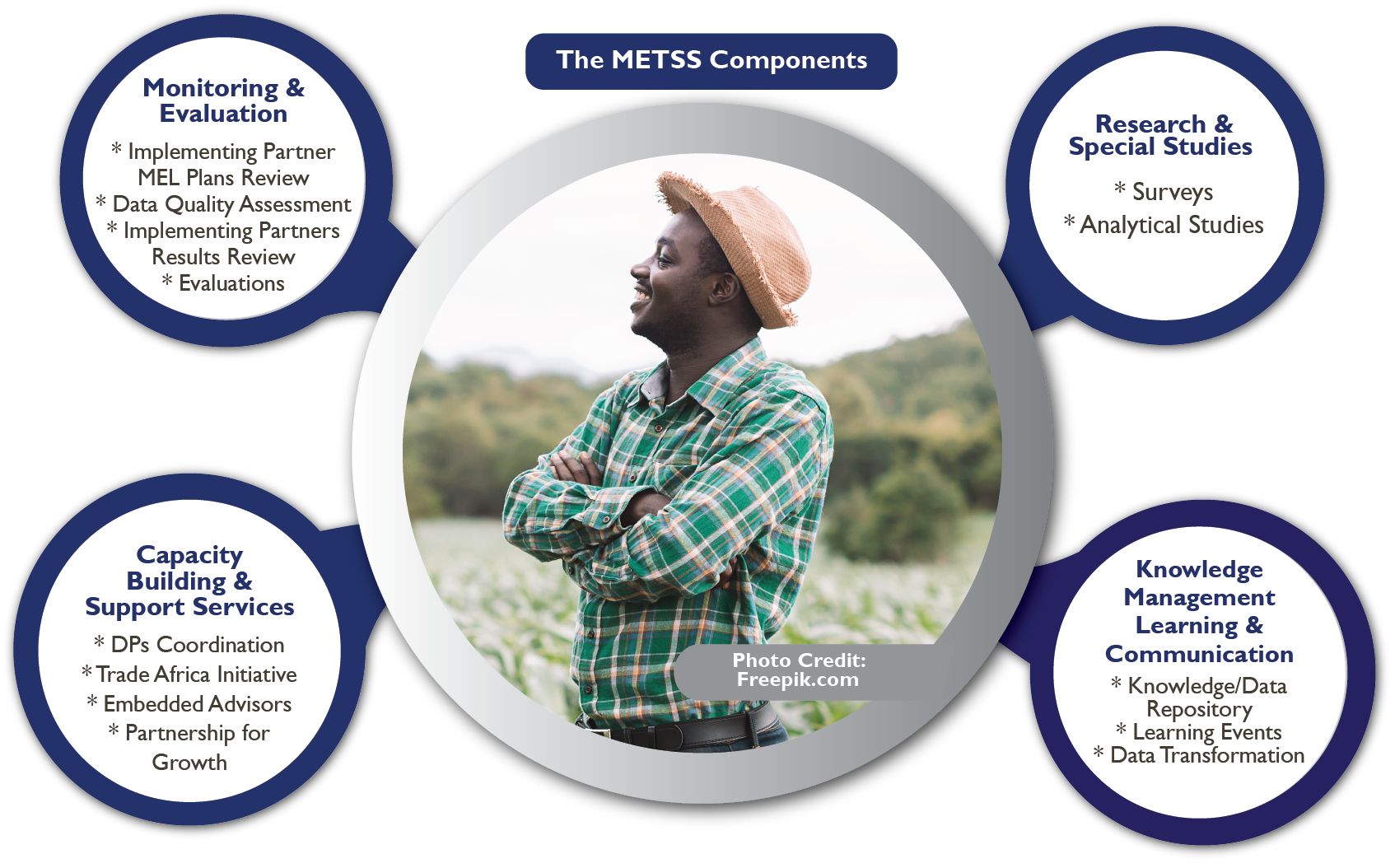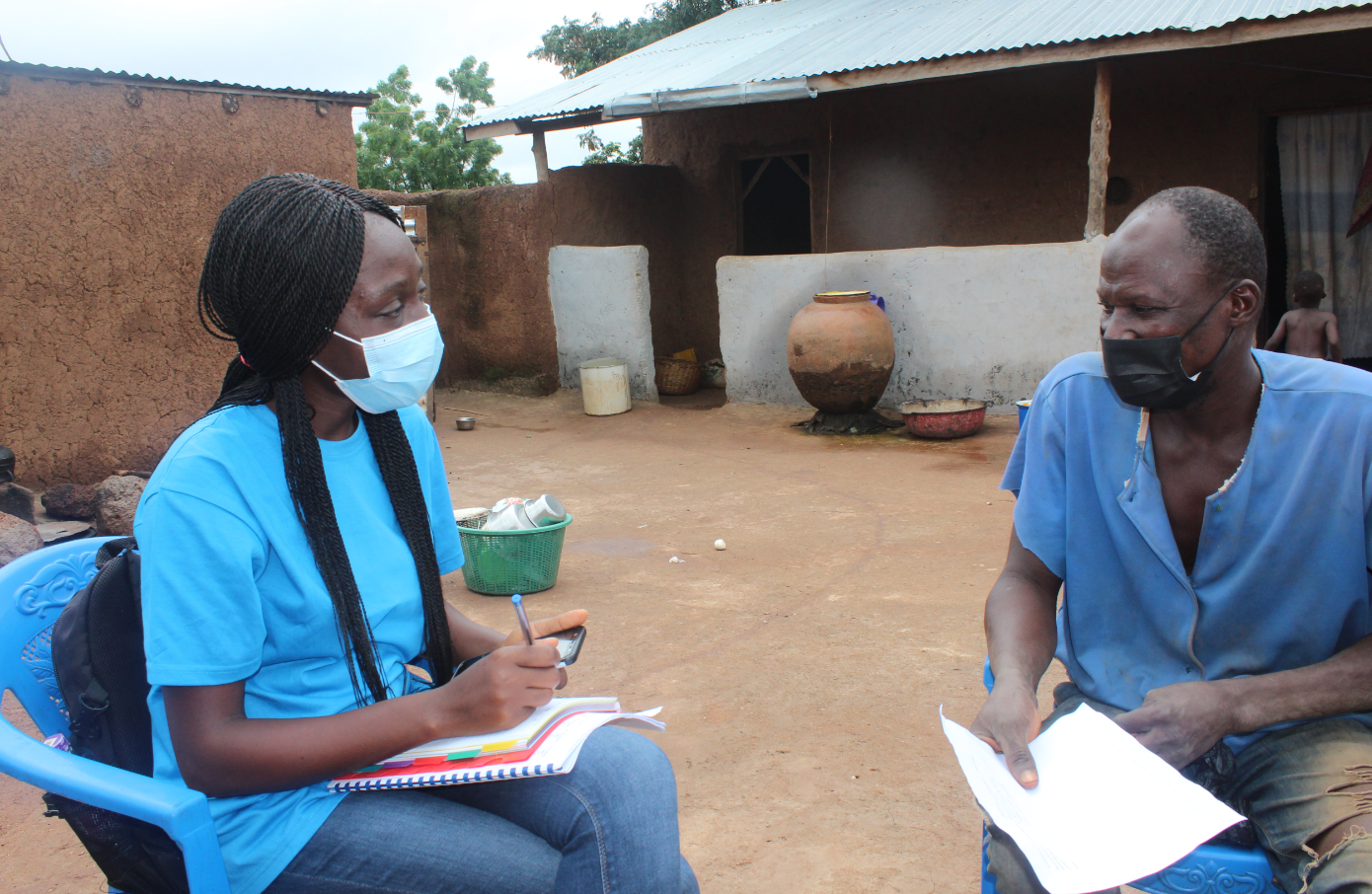Welcome - METSS-II
USAID Monitoring Evaluation and Technical Support Services (METSS) II Project
Background
The creation of the Monitoring, Evaluation, and Technical Support Services (METSS) in 2010 was necessitated by a number of strategic reasons: (1) to resolve the development challenges related to the collection and validation of development data for USAID/Ghana’s work; (2) leverage more technical and intellectual resources in US Government agencies, US Land Grant Universities and local Ghanaian universities to carry out research on northern Ghana for USAID/Ghana and its implementing partners to use in informing policy and the design of new projects, including theUSAID/Ghana’s Country Development Cooperation Strategy; (3) to resolve the challenges around the low confidence in the quality of data produced by USAID-funded projects and some Government of Ghana Agencies (GoG). METSS was, thus, designed to provide research and analysis to inform public and private sector decision-making and policy, as well as support the USAID/Ghana’s Economic Growth Office to provoke meaningful evidence-based discussion around key development issues. METSS was also mandated to build the capacity of USAID/Ghana Economic Growth Office’s partners and a number of GoG Ministries, Departments, and Agencies (MDAs) to better monitor and evaluate their development interventions.
The goal of METSS is to “Support improved evidence-based project planning, implementation, and reporting.” The Activities are designed to achieve two intermediate results (IRs).
- IR 1: Increased performance management of USAID/Ghana-funded projects to meet USAID Monitoring, evaluation, and learning (MEL) requirements; and,
- IR 2: Increased knowledge, data, and information for use in policy, strategic planning, project design, and implementation.
The implementation of planned activities by METSS staff was expected to culminate in the attainment of the following key results (sub-IRs):
- Improved monitoring, evaluation, and learning (MEL) plans developed by USAID/Ghana-funded projects (Sub-IR 1.1);
- Improved confidence in and quality of the implementing partners (IPs) performance data (Sub-IR 1.2);
- Increased capacity of USAID/Ghana to conduct surveys, analytical studies, and project evaluations (Sub-IR 1.3);
- Increased availability and access to evidence-based data, information, and knowledge to support better policy and project design and implementation (Sub-IR 2.1); and,
- Strengthened capacity of the GoG MDAs to use evidence-based data, information, and knowledge for a more effective policy and programmatic contributions to the achievement of the USAID/Ghana CDCS Development Objectives, and GoG goals (Sub-IR 2.2).
The underlying hypothesis for METSS is that:
- If USAID/Ghana partners have improved monitoring, evaluation, and learning (MEL) plans (Sub-IR 1.1);
- If USAID/Ghana has greater confidence in the MEL data being generated by its partners (Sub-IR 1.2);
- If USAID/Ghana increases its capacity to conduct policy relevant surveys, analytical studies, and project assessments in its zone of influence (ZOI) (Sub-IR 1.3);
- If there is more easy-to-access evidence-based data, information and knowledge to support better policy and project design and implementation (Sub-IR 2.1); and,
- If the GoG MDAs increase their capacity to use this data, information and knowledge (sub-IR 2.2);
Then;
Improved evidence-based project planning, implementation, and reporting will occur in the USAID/Ghana-funded activities in its strategic zone of influences (METSS II DO), and sustainable development will accelerate in the USAID/Ghana’s ZOI, culminating in a more self-reliant Ghana, offering a productive, healthy life to all its citizens (USAID/Ghana’s CDCD goal).
Activities of METSS Include:
- Strengthening and expanding support to the USAID/Ghana, its implementing partners, and the Government of Ghana to collect, analyze, and report on a robust set of indicators that are part of the USAID/Ghana’s Country Development Cooperation Strategy’s Performance Management Plan (PMP) (Monitoring and evaluation services);
- Analyzing and distilling information from indicators, studies and quarterly reports to find thematic linkages for collaboration across USAID/Ghana’s Economic Growth, and Health Population and Nutrition Offices portfolios, and to better understand how USAID’s programs are working together to achieve their impact (Learning and creating the right collaboration for impacts);
- Collect, process, store, and disseminate information on the outcomes and the impact of USAID interventions (knowledge management)
- Serve as advisory services to technical experts in three Government of Ghana Ministries- Ministry of Finance, Ministry of Food and Agriculture, and Ministry of Trade and Industry (Policy advisory services to the Ministry of Food and Agriculture, Trade and Industry, and Finance); and
- Forge strong relationships with government institutions by bringing together all development partners and NGOs to discuss policy and coordination issues (Donor coordination).
The METSS Components

Key Achievements
Since FY2014, METSS has achieved the following under its intermediate result 1 (IR 1):
- Supported 35 USAID/Ghana-funded activities (Implementing Partners) to design and operationalize their MEL plans. METSS also supported11 GoG energy sector agencies to design new M&E plans for use in managing their institutions;
- Ensured that 100% of all standard indicators (35 in total) reported externally to USAID/Washington and other US Government (USG)agencies had valid data quality assessments
- Completed nine performance evaluations for seven implementing partner projects between fiscal year (FY) 2015-FY 2022.
- Supported the USAID/Ghana Economic Growth Office and its implementing partner projects to organize and enter data into the new USAID Development Information Solution (DIS) system. Data entry was formerly done through the Feed the Future Monitoring System (FTFMS),which METSS coordinated since the inception of the FTFMS in FY 2012. METSS developed a five-step process to verify and validate the data from the implementing partners as follows:
- IP projects submit their annual reports with data to USAID/Ghana in October of each year. USAID/Ghana then shares the reports with METSS;
- IP projects then enter their indicator data, deviation narratives when they exceed/underperform any indicator by 10%, and/or performancenarratives before submitting to USAID/Ghana;
- METSS reviews both the narrative report submitted in October and the data in the DIS, and where there are discrepancies, IP projectsare asked to explain them;
- Where the data is questionable, USAID staff and staff of METSS are designated to go onsite to identify the data bottleneck andprovide information on whether or not to approve the data; and
- Once USAID/Ghana and METSS determine all the issues were satisfactorily addressed, the data entered into the DIS by the IPprojects are approved as credible and submitted to USAID/Washington.
- Other achievements made include (1) support in collating data to inform the USAID/Ghana annual Performance Plan Report (PPR), and portfolio reviews; (2) undertaking literature review to support USAID programming; (3) establishing targets for higher-level indicators; and (4) building the capacity of IP project MEL specialists (more than 50 in total) to better manage the IP projects MEL Units.
METSS achieved the following results under its research and special studies component:
Completed six population-based surveys (PBS) since FY 2014. These include:(1) four Feed the Future (FTF) PBS in the FTF Phase 1 Zone of Influence (ZOI) on poverty, nutrition and women empowerment in agriculture index (WEAI); (2) two agricultural production surveys in the FTF P1 ZOI, which focused on gross margins and yields; (3) a national poultsy farm census that profiles the poultry industry in Ghana culminating in the design and implementation of two poultry projects in the sector by the GoG and USDA; and (4) a nation-wide suppressed demand and willingness to pay for electricity survey in Ghana.
METSS also completed five project level beneficiaries-based surveys involving the RING, SPRING and IWAD PICA projects;
METSS produced over 30 research papers, policy briefs and analytical studies to support the work of USAID in Ghana (the researchpapers and briefs can be obtained from www.ghanalinks.org).
Produced and published 58 District profiles for all the districts in the USAID/Ghana FTF P1-ZOI (see https://ghanalinks.org/feed-the-future-ghana-district-profiles).
METSS achieved the following under its intermediate results 2 (IR 2)
- Designed and published a data and information repository (www.ghanalinks.org) in FY 2016, which has become the “Go-to” web resource for development partners needing data and information on USAID/Ghana’s work in Ghana.
- Increased the Economic Growth Office’s capacity to organize and conduct learning events, including providing appropriate branding and the required optics for all USAID-organized events.
- Supported three Embedded Advisors in three Ministries in Ghana to achieve the following:
- Technical assistance to the Ministry of Food and Agriculture (MoFA), Ministry of Finance (MoF) and the Bank of Ghana (BoG) toestablish the Ghana Incentive-based Risk-sharing System for Agricultural Lending (GIRSAL), which started operations in 2019
- Technical assistance to MoFA to establish the Tree Crop Development Authority
- Established the Ghana International Trade Commission (GTI) under MoTI, which is helping mediate issues related to unfair trade, andbarriers to trade in Ghana
- Technical assistance to MoF to design the COVID-19 Alleviation and Revitalization of Enterprises Support (CARES) program; and
- Provided coordination support to the Agriculture Sector Working Group to better organize and increase donor collaboration and coordination in the agriculture sector.

Saaka Adams,Chief of OperationsNo. 10 Wuogon Close, East Cantonments, Accra. Email: sadams@metssghana.org / saaka.adams.saaka@gmail.com Office: +233 302 776 084 ext. 123 Mobile: +233 244 707 403 |
Eunice Osei YeboahAdmin and Procurement ManagerNo. 10 Wuogon Close, East Cantonments, Accra. Email: e.yeboah@metssghana.org Office: Office: +233 302 776 084 Mobile: +233 240 508 194 |
